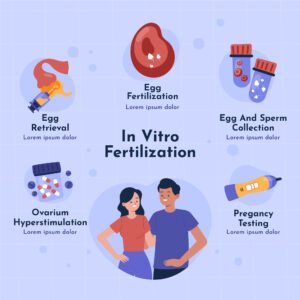When you start looking into IVF and fertility, it’s easy to feel swamped by the sheer amount of information out there. Unfortunately, not all of it is accurate. In fact, many myths and misconceptions surround this sensitive topic, leading to unnecessary stress and confusion for those trying to conceive. Whether you’re considering IVF for yourself or simply seeking to better understand fertility issues, it’s crucial to separate fact from fiction. So let’s dive into some of the most common myths about IVF and fertility and clarify the truth behind them.
What is IVF and How Does It Work?
Before we tackle the myths, let’s briefly explain what IVF (In Vitro Fertilization) actually is. IVF is a type of assisted reproductive technology (ART) used to help individuals or couples conceive a child. The process involves retrieving eggs from a woman’s ovaries, fertilizing them with sperm in a laboratory, and then transferring the resulting embryo(s) back into the uterus.

The process is as complex as it is emotional than it sounds, but for many, it offers hope when natural conception isn’t possible. Now that we’ve covered the basics, let’s dive into the myths.
Myth 1: IVF Always Works on the First Try
One of the most persistent myths about IVF and fertility is that IVF will work immediately, offering a guaranteed baby after just one cycle. While it would be wonderful if this were true, the reality is much more nuanced. Success rates for IVF vary depending on numerous factors, including the age of the woman, the quality of the eggs and sperm, and any underlying medical conditions.
On average, the success rate for IVF in women under 35 is about 40%, but this percentage decreases with age. This means that many people may need more than one cycle to achieve a successful pregnancy. Some may undergo multiple cycles before conceiving, and unfortunately, some may not conceive at all with IVF. Understanding that IVF is not a sure thing can help set realistic expectations and prepare for the possibility of needing more than one attempt.
Myth 2: IVF is the Only Option for Fertility Problems
Another common misconception is that IVF is the only option available for those facing fertility issues. While IVF is certainly one of the most well-known and widely used treatments, it’s far from the only option. Fertility treatments can range from lifestyle changes and medications to less invasive procedures like intrauterine insemination (IUI).
For some individuals and couples, simpler and less expensive treatments may be effective. It’s essential to consult with a fertility specialist who can assess your unique situation and recommend the best course of action. IVF is a powerful tool, but it’s not always the first step, nor is it always necessary.

Myth 3: IVF and Fertility Treatments Are Unaffordable for Most People
The cost of IVF and fertility treatments can indeed be high, which has led to the belief that these options are out of reach for most people. While there’s no denying that IVF can be expensive, especially when multiple cycles are needed, it’s important to know that there are financial resources available to help make fertility treatments more affordable.
Many insurance plans now offer some coverage for fertility treatments, and various clinics offer payment plans, grants, and discounts. Additionally, some states have laws that require insurance companies to cover fertility treatments, which can significantly reduce out-of-pocket costs.
It’s also worth exploring options like shared-risk programs, where you pay a set fee for multiple IVF cycles, with a partial refund if they’re unsuccessful. While cost is certainly a consideration, assuming that IVF is entirely unaffordable without exploring all options is a misconception that may prevent some from pursuing it.
Myth 4: IVF Increases the Risk of Birth Defects
Concerns about the health of babies conceived through IVF are understandable, but the idea that IVF significantly increases the risk of birth defects is a myth. Research has shown that the vast majority of babies born through IVF are healthy and do not have a higher risk of birth defects than babies conceived naturally.
There is a slightly higher risk of certain conditions, but this is often due to the underlying infertility issues rather than the IVF process itself. It’s also important to remember that all pregnancies, whether through IVF or natural conception, carry some level of risk. Regular prenatal care and monitoring are crucial to ensure the health of both mother and baby.
Myth 5: IVF is Only for Women
When people think about IVF and fertility, they often assume that the focus is solely on women. However, fertility issues affect both men and women, and IVF can be a solution for problems related to either partner. Male factor infertility, such as low sperm count or poor sperm motility, can be a significant reason for couples to turn to IVF.
In many cases, IVF is used in conjunction with other techniques, such as Intracytoplasmic Sperm Injection (ICSI), where a single sperm is injected directly into an egg. This method is particularly helpful when male infertility is a contributing factor. Understanding that IVF is a tool for addressing both male and female fertility issues can broaden perspectives and reduce stigma around seeking treatment.

Myth 6: Lifestyle Has No Impact on IVF Success
There’s a common belief that once you’re undergoing IVF and fertility treatments, lifestyle factors no longer matter. This couldn’t be further from the truth. While IVF involves sophisticated medical technology, the basics of health and wellness still play a crucial role in its success.
Factors such as diet, exercise, stress levels, and overall physical health can significantly impact fertility and the outcomes of IVF. Smoking, excessive alcohol consumption, and poor diet can all reduce the chances of IVF success. On the other hand, maintaining a healthy weight, eating a balanced diet rich in nutrients, and managing stress through activities like yoga or meditation can improve your chances.
It’s important to work closely with your healthcare provider to optimise your health before and during IVF treatment. Remember, IVF is not just about the technology; it’s also about creating the best possible environment for conception.
Myth 7: Age Doesn’t Matter with IVF
A common misconception is that IVF can overcome the age-related decline in fertility, allowing women to conceive at any age. While IVF can indeed help many women who struggle with infertility, it’s not a magic bullet that can completely negate the effects of aging on fertility.
As women age, the quantity and quality of their eggs decrease, leading to lower success rates with IVF. Women under 35 typically have higher success rates with IVF, while those over 40 may face more challenges. For women in their late 30s and early 40s, IVF can still be an effective option, but the success rates are lower, and more cycles may be required.
It’s also worth noting that the age of the male partner matters too, as sperm quality can decline with age. Although IVF offers hope to many, it’s essential to be realistic about its limitations, especially regarding age.
Myth 8: Multiple Births are Inevitable with IVF
The image of celebrities having twins or triplets after undergoing IVF has fueled the misconception that multiple births are a guaranteed outcome of the treatment. While it’s true that IVF has been associated with a higher incidence of multiple births, advances in the procedure have made it possible to significantly reduce this risk.
One of the ways clinics reduce the chances of multiple births is by transferring fewer embryos during the IVF process. In the past, doctors might have transferred multiple embryos to increase the likelihood of pregnancy, which also increased the chances of twins or triplets. Today, however, single embryo transfer (SET) is becoming more common, particularly for younger women or those with a good prognosis.
Discussing the risks and benefits of transferring one versus multiple embryos with your doctor can help you make an informed decision that aligns with your preferences and health considerations.
Myth 9: Stress Causes Infertility
Stress is often cited as a major factor in infertility, leading to the belief that simply “relaxing” or “taking it easy” could result in conception. While stress can impact your overall health and well-being, the idea that it is a primary cause of infertility is a myth.
The relationship between stress and fertility is complex. While chronic stress may influence hormonal balance and menstrual cycles, it’s rarely the sole cause of infertility.
More often, stress is a result of dealing with infertility rather than the cause of it.
That said, managing stress is still important, particularly when undergoing fertility treatments like IVF. High stress levels can make the process more challenging, both emotionally and physically. Engaging in stress-reducing activities such as meditation, therapy, or gentle exercise can help you cope with the demands of fertility treatment.
Myth 10: IVF is Only for Couples with Severe Fertility Issues
Many people believe that IVF is reserved only for those with severe fertility problems or as a last resort when all other treatments have failed. While IVF is certainly an option for those with significant fertility challenges, it’s also used in a variety of other scenarios.
In some cases, IVF may be recommended as the first line of treatment if other methods are unlikely to succeed.
IVF can be an option for women with blocked fallopian tubes, men with low sperm count, or couples with unexplained infertility. It is also commonly used by same-sex couples and single individuals who wish to have a biological child.
To determine if IVF is the right option for your specific situation, consulting with a fertility specialist is a better approach.



